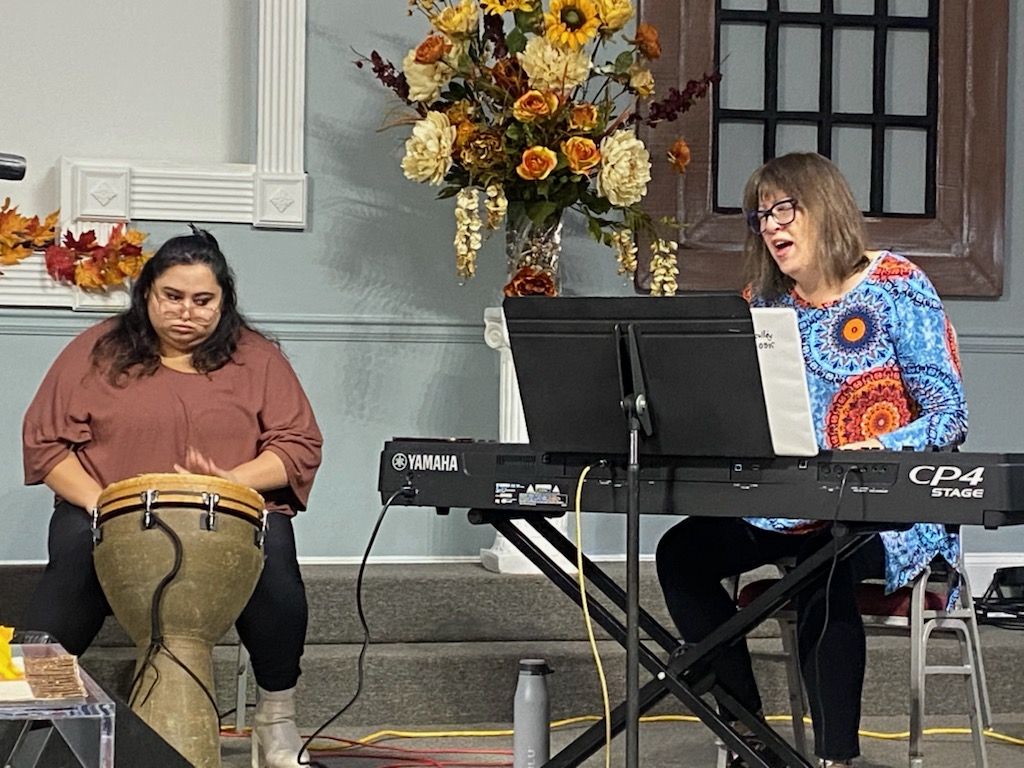His Love Endures Forever (Psalm 136)

November 20th, 2022 – His Love Endures Forever (Psalm 136)
Good morning, beautiful church family! We have the pleasure today of wrapping up our six-week series on “Psalms of Thanksgiving and Gratitude.” Today we’re looking at Psalm 136, and we will be engaging with this Psalm in two different ways. The first way is that I’m going to read it aloud – you can follow along on your handout. You can see that the verses are grouped into 8 different sections. As you listen, I’d like to invite you to listen to the Lord; notice God’s nudges in your heart; perceive the Holy Spirit’s promptings; recognize your reflections.
Psalm 136 (NIV) –
“1 Give thanks to the Lord, for he is good. His love endures forever. 2 Give thanks to the God of gods. His love endures forever. 3 Give thanks to the Lord of lords: His love endures forever.
4 to him who alone does great wonders, His love endures forever. 5 who by his understanding made the heavens, His love endures forever. 6 who spread out the earth upon the waters, His love endures forever.
7 who made the great lights—His love endures forever. 8 the sun to govern the day, His love endures forever. 9 the moon and stars to govern the night; His love endures forever.
10 to him who struck down the firstborn of Egypt His love endures forever. 11 and brought Israel out from among them His love endures forever. 12 with a mighty hand and outstretched arm; His love endures forever.
13 to him who divided the Red Sea asunder His love endures forever. 14 and brought Israel through the midst of it, His love endures forever. 15 but swept Pharaoh and his army into the Red Sea; His love endures forever.
16 to him who led his people through the wilderness; His love endures forever. 17 to him who struck down great kings, His love endures forever. 18 and killed—mighty kings—His love endures forever.
19 Sihon king of the Amorites His love endures forever. 20 and Og king of Bashan—His love endures forever. 21 and gave their land as an inheritance, His love endures forever. 22 an inheritance to his servant Israel. His love endures forever.
23 He remembered us in our low estate His love endures forever. 24 and freed us from our enemies. His love endures forever. 25 He gives food to every creature. His love endures forever. 26 Give thanks to the God of heaven. His love endures forever.”
This Psalm is known in Judaism as the “Great Hallel” or “Great Praise.” Eastern Orthodox Christians call this Psalm “Polyeleos,” which means “Many Mercies.” It is a great hymn of praise that celebrates the Lord and His love for people from eternity past through creation and human history to eternity future. In the 26 verses of this Psalm, the phrase, “His love endures forever,” is repeated 26 times, my title for today’s sermon. We also see this phrase in 1 Chronicles 16 when King David was establishing worship in the Tabernacle, or Tent of Meeting, with the Ark of the Covenant residing in the Holy of Holies. David gave instructions to the priests on giving burnt offerings and thanks to the Lord, “for his love endures forever.”
Let’s exercise our imaginations to consider those who lived in the time period when the book of Psalms was written, approximately one thousand years before Christ. When we read summaries in Scripture, we tend to forget that those people would have had personal, community, local, national, and international struggles, just as we do. In every time and place, people face similar challenges, because no matter what the circumstances are, we all struggle. People who lived thousands of years ago would have experienced family problems, financial difficulties, health issues, political intrigues, wars and rumors of wars, and acts of God. Imagine if the Psalmist, King David, had written line after line about the problems he was facing, without continuously remembering that God’s love endures forever. It would have been a completely different kind of song, probably quite depressing.
But this psalm calls to us in every verse to remember that God’s love endures forever! In this psalm, we are encouraged and reminded to look at creation. Just one glimpse at any part of God’s beautiful creation can lift our spirits from despair to hope, as we remember that the God who made all that there is, is the God of all Gods and the Lord of all Lords. Nothing is too hard for Him! We are also encouraged and reminded to remember the times when God has intervened in our lives and in the lives of those who have gone before us. How easily we forget! The opening verse of Psalm 147 declares, “Praise the Lord. How good it is to sing praises to our God, how pleasant and fitting to praise him!”
God invites us to pour out our hearts to Him at all times, but not by dwelling on the difficulties. This Psalm contains one among several models in Scripture that teach us how to pray. We are invited to adore God and to remember God’s “chesed” – variously translated as God’s love, lovingkindness, loving devotion, mercy, goodness, kindness, great mercy, steadfast love, charity. This Hebrew word speaks of mutual benevolence, mercy, or pity between people; devotional piety of people towards God; and the grace, favor, or mercy of God towards people. I have chosen to use the NIV rendering of this word today, which is, simply, “love.” God’s love endures forever!
But what if we don’t always believe that God’s love endures forever? What if we don’t always feel the urge to praise Him and declare that? If we’re honest, we recognize that we all have days or seasons or years or even decades when we can’t see or feel God’s love, God’s presence, or God’s power. We might feel like our situation will never change, and possibly, it won’t – we don’t know what God will or won’t do. Whether we feel triumphant or defeated, whether we feel faith-filled or doubting, whether we feel confident or wavering, God is ever-present with us and sits with us in our situations and circumstances, our satisfactions and sorrows, our celebrations and sufferings.
When we feel overwhelmed, we can remember Jesus, and we can remember the saints who have gone before. Matthew 26:36-39 – “Then Jesus went with his disciples to a place called Gethsemane, and he said to them, ‘Sit here while I go over there and pray.’ He took Peter and the two sons of Zebedee along with him, and he began to be sorrowful and troubled. Then he said to them, ‘My soul is overwhelmed with sorrow to the point of death. Stay here and keep watch with me.’ Going a little farther, he fell with his face to the ground and prayed, ‘My Father, if it is possible, may this cup be taken from me. Yet not as I will, but as you will.’” A 2007 article from TIME magazine reveals that Mother Teresa’s letters, many of them preserved against her wishes, reveal that for the last nearly half-century of her life she felt no presence of God whatsoever. Jesus surrendered. Mother Teresa persevered. God is calling us today to surrender all to Him, to persevere in faith by remaining faithful to Christ.
I want to take a step back from today’s Psalm for a moment and look at the Psalms as a whole. The biblical book that we call the Psalms is so titled because in the Greek translation of the Hebrew scriptures, it’s called “psalmoi” which means “instrumental music” and, by extension, “the words accompanying the music.” The Psalms were written not just as poems for reciting, but as songs for singing. Each of the psalms is an anthem of adoration or a prayer of petition to be sung by the community of faith, both in private devotions and in corporate worship. God’s people have sung the Psalms for about 3000 years. Many Christian churches today not only read but sing the Psalms as part of the worship service. By singing the Psalms, we are united in worship in the Kingdom of God along with the departed saints and the angels of heaven. This song of worship goes on forever and ever.
You’ve probably already guessed by now that the second way we will be engaging with this Psalm today is that we’re going to sing it together. I borrowed the melody for this particular Psalm from versions I found online in both Russian and Greek Orthodox liturgies (note: Eastern churches number the Psalms slightly differently, so this is Psalm 135 in Orthodox Bibles). I find great comfort in knowing that for hundreds of years, sisters and brothers in Christ have been singing this Psalm to this melody, recounting the wonderful things God has done, and remembering that His love endures forever! As I said earlier, Psalm 136 is a great hymn of praise that celebrates the Lord and His love for people from eternity past through creation and human history to eternity future. Some parts of this Psalm may be easier to understand than others, especially the historical details which might elude us. We can bring all of our family problems, financial difficulties, health issues, political intrigues, wars and rumors of wars, and acts of God, and lay these at the feet of Christ Jesus as we pour out our hearts to Him in song.
In a few minutes we are going to sing this Psalm and then take some time to “wait on the Lord.” “Waiting on the Lord” is a practice, very common in Vineyard churches, in which we set aside time during worship services to “dial down” and listen to the Holy Spirit. As we wait in expectancy, faith, and openness, the Holy Spirit may give to you or bring to your mind a Scripture, a prophetic word, an image, a vision, an inkling, a tiny thought, a prayer, an encouragement. 1 Corinthians 14:26 (The Message) – “When you gather for worship, each one of you be prepared with something that will be useful for all: Sing a hymn, teach a lesson, tell a story, lead a prayer, provide an insight.” I encourage you to share with the rest of us, with humility and with boldness, what the Lord shows you, even if you are not completely certain that what your heart or mind has perceived is from God. In the Kingdom of God, nothing is wasted. You are beautiful and created in God’s image. The Lord Jesus is present with us and God loves to give good gifts to us when we ask. Come, Holy Spirit!
One final instruction before we sing this Psalm – you are welcome to try singing the whole thing, or you may want to just sing the repeated line “His love endures forever,” as those words and their melody are identical in each of the 26 verses. This is not printed on your handout because I only included there the text of the Scripture in the NIV. But in the song version, per the Orthodox tradition, the word “Alleluia” is added at the end of each line, so we’ll be singing “Al-le-lu-i-a” 52 times. Immediately after we sing the song, we will wait in stillness before the Lord and listen to the Holy Spirit. It is during that time that you are invited to share what the Lord puts on your heart. If you would like to pray with another, I want to invite you to slip out of your seat and come to the front of the church, where someone will pray with you, listening to God with you. Let’s stand together. Are you ready to sing Psalm 136? Sing wholeheartedly, church!
Psalm 136 (NIV) –
1Give thanks to the Lord, for he is good.
His love endures for-e–ver.
2Give thanks to the God– of gods.
His love endures for-e–ver.
3Give thanks to the Lord— of lords:
His love endures for-e–ver.
4to him who alone does great won-ders,
His love endures for-e–ver.
5who by his under-stan-ding made the hea-vens,
His love endures for-e–ver.
6who spread out the earth u–pon the waters,
His love endures for-e–ver.
7who made– the– great– lights—
His love endures for-e–ver.
8the sun to go– –vern the day,
His love endures for-e–ver.
9the moon and stars to go– –vern the night;
His love endures for-e–ver.
10to him who struck down the first-born of Egypt
His love endures for-e–ver.
11and brought Is-ra-el out from a–mong them
His love endures for-e–ver.
12with a mighty hand and out-stretched arm;
His love endures for-e–ver.
13to him who di-vi-ded the Red Sea a-sunder
His love endures for-e–ver.
14and brought Is-ra-el through the midst of it,
His love endures for-e–ver.
15but swept Pha-raoh and his army into the Red Sea;
His love endures for-e–ver.
16to him who led his people through the wilder-ness;
His love endures for-e–ver.
17to him who struck down great– kings,
His love endures for-e–ver.
18and killed—migh– –ty– kings—
His love endures for-e–ver.
19Si-hon king of the A–mo-rites
His love endures for-e–ver.
20and Og– king of Ba– –shan—
His love endures for-e–ver.
21and gave their land as an in-heri-tance,
His love endures for-e–ver.
22an in-heri-tance to his servant Is-ra-el.
His love endures for-e–ver.
23He re-mem-bered us in our low es-tate
His love endures for-e–ver.
24and freed us from our e–ne-mies.
His love endures for-e–ver.
25He gives food to every crea– –ture.
His love endures for-e–ver.
26Give thanks to the God of hea– –ven.
His love endures for-e–ver.”




